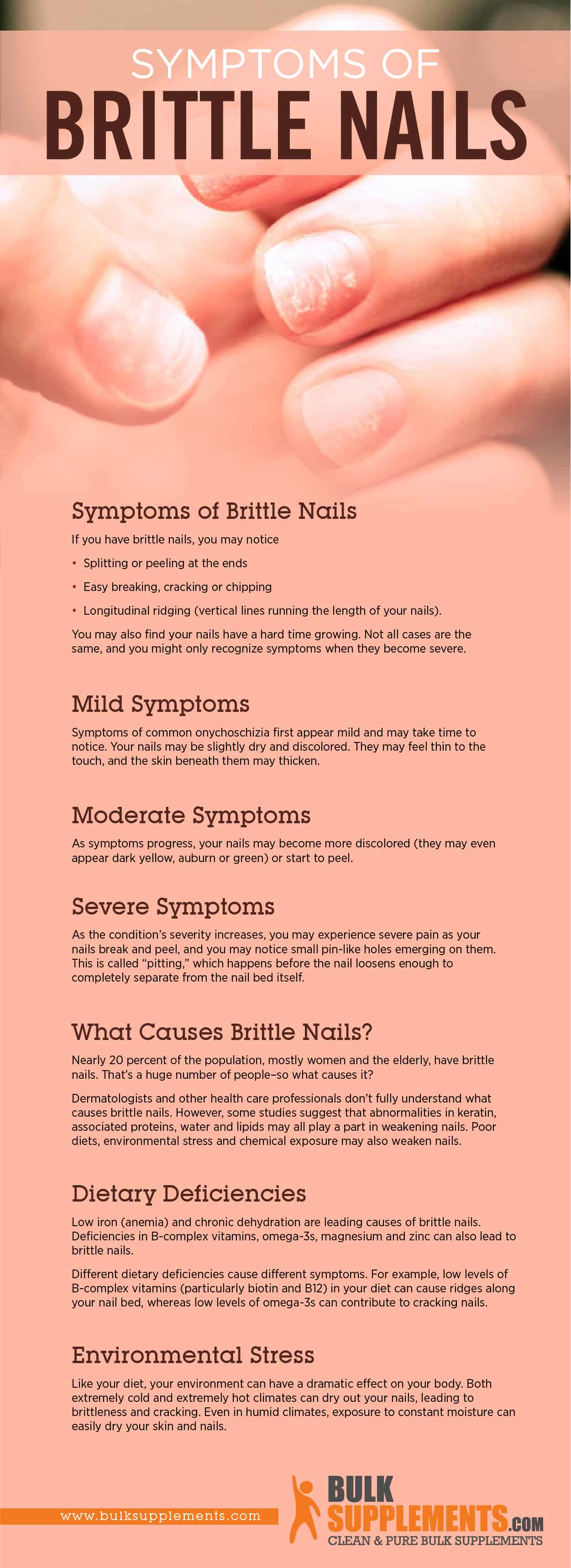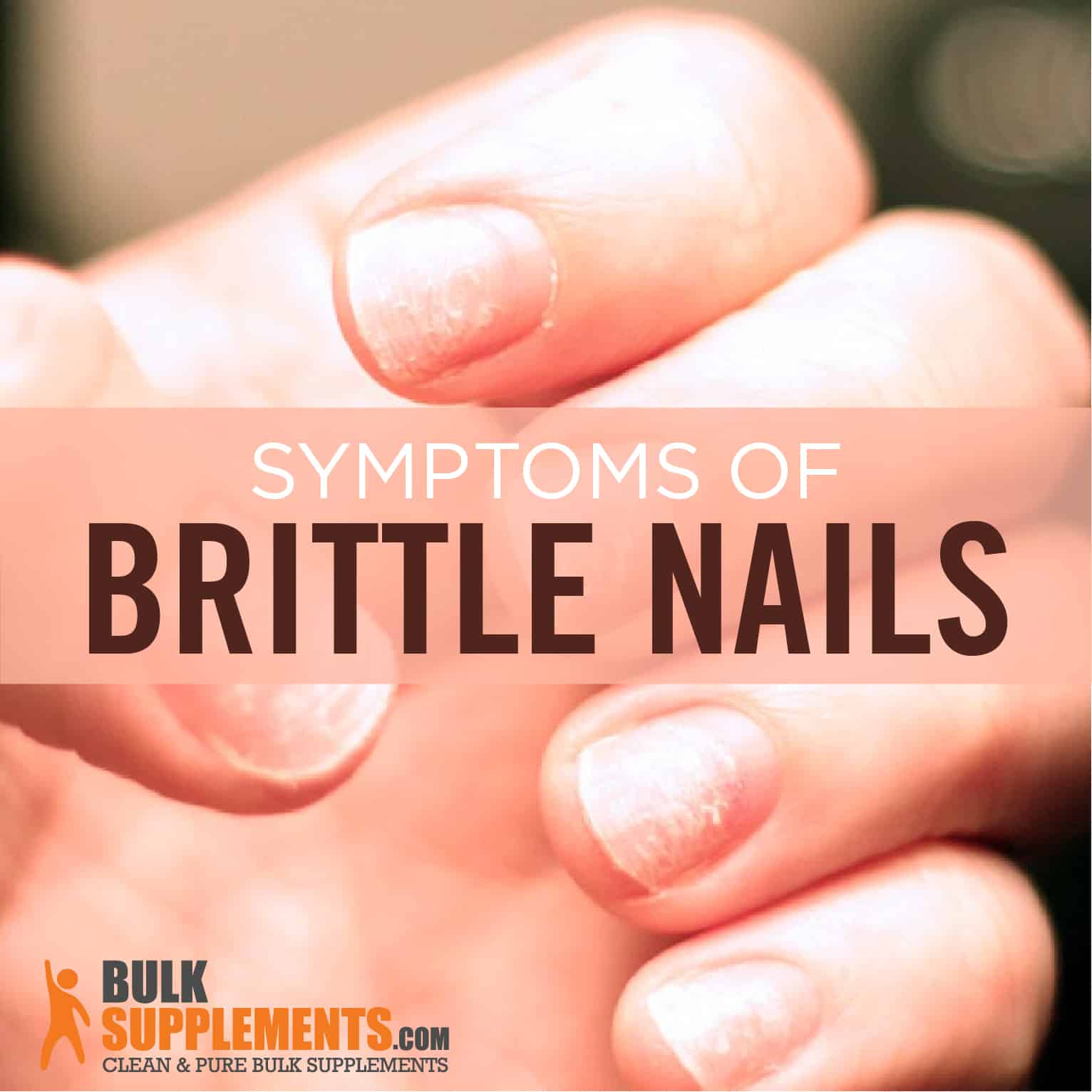What are Brittle Nails?
It’s no secret that what you eat has a huge impact on your health, and if you’re not eating right, the condition of your nails, hair and skin will reflect that.
Take a look at your fingernails. Healthy fingernails consist of layers of keratin, a fibrous protein. Deficiencies in vitamins and minerals from poor diets and underlying health issues can weaken the keratin layers on your nails, which can become thin and brittle, unable to protect themselves from external damage(x).
Dermatologists and other health care professionals call this condition onychoschizia, which can be very painful (x). The good news is, you can prevent brittle nails by eating right, avoiding environmental stress, and preventing chemical damage.
Symptoms of Brittle Nails
If you have brittle nails, you may notice
- Splitting or peeling at the ends
- Easy breaking, cracking or chipping
- Longitudinal ridging (vertical lines running the length of your nails).
You may also find your nails have a hard time growing. Not all cases are the same, and you might only recognize symptoms when they become severe.
Mild Symptoms
Symptoms of common onychoschizia first appear mild and may take time to notice. Your nails may be slightly dry and discolored. They may feel thin to the touch, and the skin beneath them may thicken (x)(x).
Moderate Symptoms
As symptoms progress, your nails may become more discolored (they may even appear dark yellow, auburn or green) or start to peel (x)(x).
Severe Symptoms
As the condition’s severity increases, you may experience severe pain as your nails break and peel, and you may notice small pin-like holes emerging on them. This is called “pitting,” which happens before the nail loosens enough to completely separate from the nail bed itself (x)(x).

What Causes Brittle Nails?
Nearly 20 percent of the population, mostly women and the elderly, have brittle nails. That’s a huge number of people–so what causes it?
Dermatologists and other health care professionals don’t fully understand what causes brittle nails. However, some studies suggest that abnormalities in keratin, associated proteins, water and lipids may all play a part in weakening nails. Poor diets, environmental stress and chemical exposure may also weaken nails (x)(x).
Other causes may include the following:
Dietary Deficiencies
Low iron (anemia) and chronic dehydration are leading causes of brittle nails. Deficiencies in B-complex vitamins, omega-3s, magnesium and zinc can also lead to brittle nails.
Different dietary deficiencies cause different symptoms. For example, low levels of B-complex vitamins (particularly biotin and B12) in your diet can cause ridges along your nail bed, whereas low levels of omega-3s can contribute to cracking nails (x)(x).
Environmental Stress
Like your diet, your environment can have a dramatic effect on your body. Both extremely cold and extremely hot climates can dry out your nails, leading to brittleness and cracking. Even in humid climates, exposure to constant moisture can easily dry your skin and nails (x).
Chemical Exposure
Nail polish and nail polish removers were once believed to cause brittle nails, but recent studies have debunked that belief (x). If you wear nail polish daily, dermatologists recommend letting your nails breathe from time to time and using nail conditioners to help them stay hydrated and healthy.
If you work with harsh chemicals (including household cleaners) and don’t wear gloves, you can weaken your nails. Overexposure to chemicals like nicotine from cigarettes—and even water—will strip keratin off your nails. So when you wash your dishes, make sure to wear gloves(x).
Underlying Health Conditions
Underlying health conditions and medications used to treat them can also cause brittle nails. Iron deficiency and anemia are leading causes.
Healthy nails need oxygen, which is carried around the body by hemoglobin in the bloodstream. Your body needs iron to make hemoglobin. Less iron means less hemoglobin, and less hemoglobin means less oxygen getting to your nails, leading to brittleness and breakage.
Similarly, low hormone levels from an underactive thyroid (hypothyroidism) can also cause brittle nails.
Brittle nails may also be a sign of lung disease or kidney disease.
Raynaud’s syndrome (or Raynaud’s phenomenon), which causes circulation issues in your hands and feet and makes your fingers and toes feel cold and numb, can also affect the health of your nails (x).
If you’re undergoing chemotherapy to treat cancer, you’ll experience a number of unpleasant side effects, including brittle nails. Talk to your oncology team to learn how to keep them healthy and strong (x).
Supplements for Brittle Nails
Since the most common causes of brittle nails are dietary deficiencies, environmental stress and chemical exposure, you can do many things to boost the health of your nails and prevent brittle nails altogether.
First, control your exposure to moisture and harsh chemicals wherever and whenever you can. When you continually soak your hands in water, you dry out your nails. Wear gloves when you do dishes and household chores. If you have to wash your hands frequently, use topical hand and nail treatments to combat dryness. If you have to expose your hands to chemicals, wear gloves and then promptly wash your hands (x).
Prevention and Treatment with Dietary Supplements
You can also take supplements for brittle nails:
- Applied topically or taken orally, vitamin E is a potent antioxidant that can strengthen and protect your nails. It’s available in capsules, as vitamin E softgels, or as vitamin E powder.
- Eat foods rich in iron, omega-3s, B-complex vitamins, zinc and magnesium to support healthy nails.
Foods That Protect Your Nails
- Iron: Legumes (lentils, tofu and lima beans), whole grains (quinoa, brown rice and oats), nuts and seeds (cashews and sunflower seeds), tomatoes, green chard, collard greens and prunes.
- Omega-3s: Flax meal, chia seeds, Brussels sprouts, algal oil, hemp seeds and walnuts.
- B-complex vitamins: Consume plant-based milks and nutritional yeasts, almonds, cauliflower, mushrooms, sweet potatoes and spinach.
- Zinc: Beans and legumes, tofu, tempeh, soybeans, kidney beans, garbanzo beans, lentils and peanuts, as well as nuts and seeds, oats, wheat germ and nutritional yeast.
- Magnesium: Eat dark chocolate. Should be easy, right? While you’re at it, try eating more avocados, nuts, legumes, tofu, seeds, whole grains, bananas and leafy greens.
The Bottom Line
Remember that the outward appearance of your hair, skin and nails says a lot about your health. You might have brittle nails for a number of reasons, but with the right diet and proper supplementation, you may be able to treat or prevent them altogether. In any case, you should talk to your doctor before making dietary changes and ask how supplements can affect your health.
By: Meghan Carney


